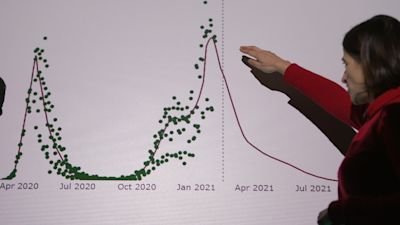Covid: What the future holds after the UK emerges from coronavirus lockdown
Tom Clarke
Former Science Editor

Video report by ITV News Science Editor Tom Clarke
The government has promised to publish its roadmap out of lockdown on February 22.
To the frustration of anyone with their eyes on the economy, or hoping for a foreign holiday at Easter, it's looking like it will be a cautious one.
But why? Vaccinations are being rolled out faster than even the most optimistic could have predicted.
Data from countries like Israel, who have vaccinated the majority of their population, show vaccines are very effective at preventing disease, and even transmission of the virus.
In part, it's because the government knows it has failed before. Being too late to lock down, and too early to lift restrictions certainly caused more deaths than would have occurred if we'd acted faster, and harder.
But it's also because the experts advising the government have told them that it's too much to just hope vaccinations will make the problem go away immediately.
The evidence is based on computer models - simulations of the outbreak. They're akin to the weather models forecasters use every day to predict the weather.
Tom Clarke discusses new vaccines on the horizon
Just swap pressure and temperature, for infections, restrictions, and vaccines. Like weather forecasts these models aren't perfect - and they're only as reliable as the data that you feed into them. But they do work.
They've pretty reliably predicted the outcome of various aspects of the epidemic.
So what do they say about the crunch time we find ourselves in? We caught up with one of the UK's leading outbreak forecasters.
Using a new model created at Imperial College London, called COVIDSIM, Professor Azra Ghani took us through some of the key aspects of the outbreak.
From the impact of vaccinations, to the impact of lifting restrictions at different times. One thing that startled me is the fact that even with pretty decent protection from vaccines, tens of thousands of people are still vulnerable to infection and dying.
Another factor, though one that's harder to forecast, is the behaviour of new variants of Covid as we start to ease restrictions.
The computer model developed by Imperial College forecasts a significant wave of deaths as early as this summer, if we fully ease restrictions in July, even with good vaccination coverage.
Keep most restrictions in place (beyond sending schools back and allowing outdoor dining) until the majority are vaccinated in September, and the outcome is much more positive.
Although there are still small peaks of Covid infection this next winter, and the one after.